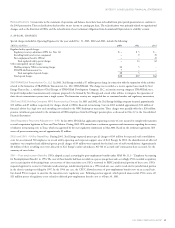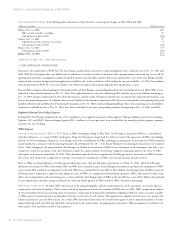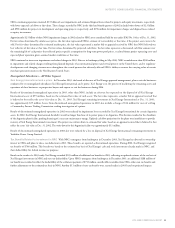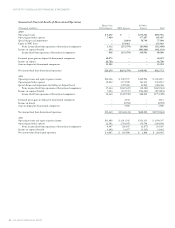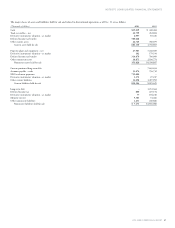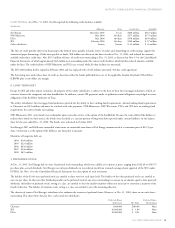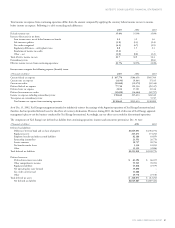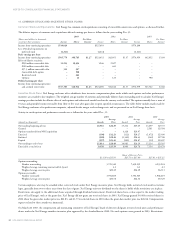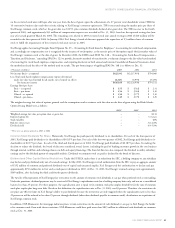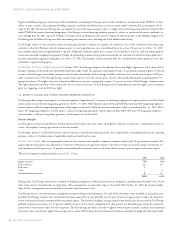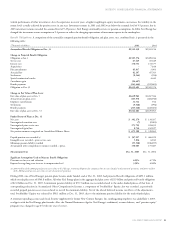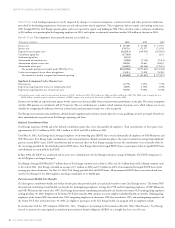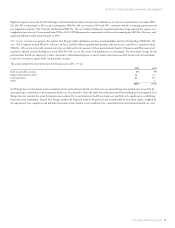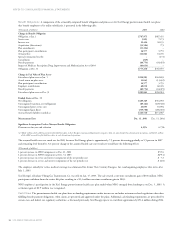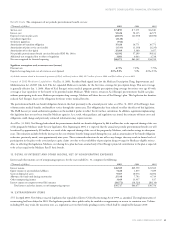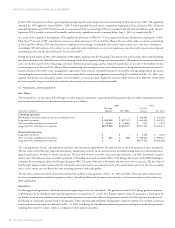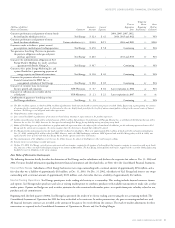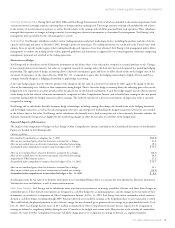Xcel Energy 2003 Annual Report Download - page 47
Download and view the complete annual report
Please find page 47 of the 2003 Xcel Energy annual report below. You can navigate through the pages in the report by either clicking on the pages listed below, or by using the keyword search tool below to find specific information within the annual report.
NOTES TO CONSOLIDATED FINANCIAL STATEMENTS
XCEL ENERGY 2003 ANNUAL REPORT 63
on the restricted stock units will lapse after one year from the date of grant, upon the achievement of a 27 percent total shareholder return (TSR) for
10 consecutive business days and other criteria relating to Xcel Energy’s common equity ratio. TSR is measured using the market price per share of
Xcel Energy common stock, which at the grant date was $12.93, plus common dividends declared after grant date. The TSR was met in the fourth
quarter of 2003, and approximately $31 million of compensation expense was recorded at Dec. 31, 2003, based on the expected vesting date (one
year after award grant) of March 28, 2004. The remaining costs related to 2003 restricted stock unit awards vesting in 2004 of $10 million will be
recorded in the first quarter of 2004. In January 2004, Xcel Energy’s board of directors approved the repurchase of 2.5 million shares of common
stock to fulfill the requirements of the restricted stock unit exercise in 2004.
Xcel Energy applies Accounting Principles Board Opinion No. 25 – “Accounting for Stock Issued to Employees,” in accounting for stock-based compensation
and, accordingly, no compensation cost is recognized for the issuance of stock options, as the exercise price of the options equals the fair-market value of
Xcel Energy’s common stock at the date of grant. In December 2002, the FASB issued SFAS No. 148 – “Accounting for Stock-Based Compensation –
Transition and Disclosure,” amending SFAS No. 123 to provide alternative methods of transition for a voluntary change to the fair-value-based method
of accounting for stock-based employee compensation, and requiring disclosure in both annual and interim Consolidated Financial Statements about
the method used and the effect of the method used on results. The pro forma impact of applying SFAS No. 148 is as follows at Dec. 31:
(Thousands of dollars) 2003 2002 2001
Net income (loss) – as reported $622,392 $(2,217,991) $794,966
Less: Total stock-based employee compensation expense determined
under fair value based method for all awards, net of related tax effects (6,223) (6,959) (3,455)
Pro forma net income $616,169 $(2,224,950) $791,511
Earnings (loss) per share:
Basic – as reported $1.55 $(5.82) $ 2.31
Basic – pro forma $1.54 $(5.84) $ 2.30
Diluted – as reported $1.50 $(5.77) $ 2.30
Diluted – pro forma $1.49 $(5.79) $ 2.29
The weighted-average fair value of options granted, and the assumptions used to estimate such fair value on the date of grant using the Black-Scholes
Option Pricing Model were as follows:
2003*2002*2001
Weighted-average fair value per option share at grant date –– $2.13
Expected option life ––3–5 years
Stock volatility –– 18%
Risk-free interest rate –– 3.8–4.8%
Dividend yield –– 4.9–5.8%
* There were no options granted in 2003 or 2002.
Common Stock Dividends Per Share Historically, Xcel Energy has paid quarterly dividends to its shareholders. For each of the four quarters of
2003, Xcel Energy paid dividends to its shareholders of $0.1875 per share. For each of the first two quarters of 2002, Xcel Energy paid dividends to its
shareholders of $0.375 per share. In each of the third and fourth quarters of 2002, Xcel Energy paid dividends of $0.1875 per share. In making the
decision to reduce the dividend, the board of directors considered several factors, including the goal of funding customer growth in the core business
through internal cash flow and reducing reliance on debt and equity financings. The board of directors also compared the dividend to utility subsidiary
earnings and to the dividend payout of comparable utilities. Dividends on common stock are paid as declared by the board of directors.
Dividend and Other Capital-Related Restrictions Under the PUHCA, unless there is an order from the SEC, a holding company or any subsidiary
may declare and pay dividends only out of retained earnings. In May 2003, Xcel Energy received authorization from the SEC to pay an aggregate amount
of $152 million of common and preferred dividends out of capital and unearned surplus. Xcel Energy used this authorization to declare and pay
approximately $150 million for its first and second quarter dividends in 2003. At Dec. 31, 2003, Xcel Energy’s retained earnings were approximately
$369 million, after declaring the third and fourth quarter dividends.
The Articles of Incorporation of Xcel Energy place restrictions on the amount of common stock dividends it can pay when preferred stock is outstanding.
Under the provisions, dividend payments may be restricted if Xcel Energy’s capitalization ratio (on a holding company basis only, and not on a consolidated
basis) is less than 25 percent. For these purposes, the capitalization ratio is equal to (i) common stock plus surplus divided by (ii) the sum of common
stock plus surplus plus long-term debt. Based on this definition, the capitalization ratio at Dec. 31, 2003, was 83 percent. Therefore, the restrictions do
not place any effective limit on Xcel Energy’s ability to pay dividends because the restrictions are only triggered when the capitalization ratio is less than
25 percent or will be reduced to less than 25 percent through dividends (other than dividends payable in common stock), distributions or acquisitions of
Xcel Energy common stock.
In addition, NSP-Minnesota’s first mortgage indenture places certain restrictions on the amount of cash dividends it can pay to Xcel Energy, the holder
of its common stock. Even with these restrictions, NSP-Minnesota could have paid more than $815 million in additional cash dividends on common
stock at Dec. 31, 2003.


